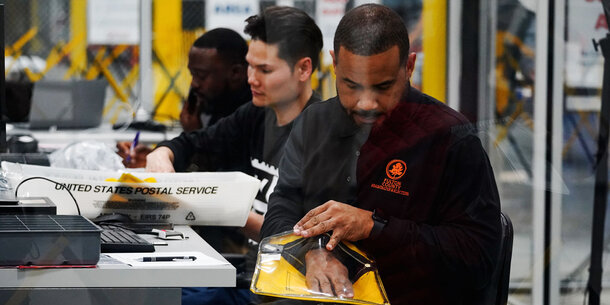You’re reading The Briefing, Michael Waldman’s weekly newsletter. Click here to receive it every week in your inbox.
The 2022 midterms will be a referendum on elections themselves.
Look at Pennsylvania, where State Sen. Doug Mastriano, a leading proponent of the Big Lie that fraud decided the 2020 election, won the GOP primary for governor. He ran on a promise to “decertify” the 2020 results, has raised the prospect of the state legislature appointing its own slate of electors in future presidential elections, and proposes to wipe all voters from the rolls. “You’re going to have to re-register — we’re going to start all over again,” he bragged.
Mastriano is far from alone in his views on voter fraud. The Brennan Center today released a new installment in our series on election deniers on the ballot. It paints a picture of candidates nationwide, up and down the ballot, campaigning on false allegations of voter fraud.
The Republican Party of Minnesota recently endorsed for governor Scott Jensen, who has called the election process “bastardized” and implied that the Minnesota secretary of state could be jailed for it. Michigan Republicans nominated for secretary of state Kristina Karamo, who claims there is a “massive coverup” of 2020 election fraud. The list of election deniers running for office goes on and on.
Election administrator races once were mostly sleepy local affairs. Now they are nationalized, with funds flowing on both sides. Candidates for secretary of state have raised $13.3 million across six battleground states so far during this cycle, more than two and a half times the $4.7 million raised by this point in 2018 and more than five times as in 2014. Much of the money given to these candidates comes from outside the state.
This is not the first year candidates have tried to interfere with the vote. In 2011, when state legislatures changed hands, many Republicans enacted measures to restrict voting rights. They were not responding to any public demand. Rather, it was a partisan move they thought they could get away with. (As it happens, courts blocked or blunted most of the worst laws.) Now, alarmingly, calls for restrictive voting measures are coming from constituents. Many officials know the fraud claims are nonsense. But millions of voters — and a surprising number of donors — don’t. They believe the lie. It is now an organizing, mobilizing, unifying political issue on the right.
Here’s a hint that the politicians at least know better (a hint in, of all places, Pennsylvania). Mehmet Oz and Dave McCormack are locked in a tight race for the Republican nomination for U.S. Senate. Oz’s lead has shrunk to less than 1,000 votes. The margin will come from mail ballots with disputed dates, which are still being counted. Amazingly, neither candidate has screamed “fraud!” or “rigged!” or “stop the steal!” Not yet, at least. You see, the election is only fraudulent when you lose.



